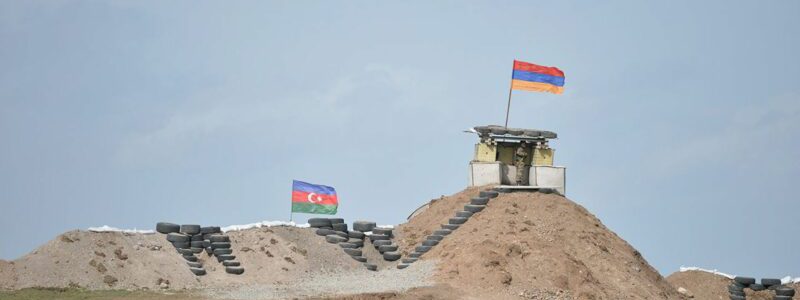After Azerbaijan’s seizure of the unrecognized Armenian republic of Artsakh (Nagorno-Karabakh), Baku, in alliance with Turkey, has the opportunity to continue to increase its influence in the region and the world.
The defeat of units of the Artsakh Defense Army by the armed forces of Azerbaijan with the inaction of Russian peacekeepers stationed in Nagorno-Karabakh and the subsequent exodus of the Armenian population from the territory of the republic, in fact, closes the Karabakh issue for Azerbaijan. Moreover, we are not talking about a return to the situation of the late 80s, when, despite the NKAO belonging to the AzSSR, mainly the Armenian population lived there, and the territorial unit itself had an autonomous status. In just a few days, Karabakh will completely lose its Armenian segment, and no autonomy is expected.
This outcome frees up strength for Azerbaijan for further activities in the region – in particular, the fight for the extraterritorial Zangezur corridor, which can connect the country through Nakhichevan with allied Turkey and bring the integration of the two Turkic states to a qualitatively new level.
The success of this kind of initiative will not only increase the economic and military capabilities of the Ankara-Baku axis, but also, due to a fundamental increase in the authority of the bloc, will significantly increase its political capabilities – both among Turkic states and societies, and in the Muslim world. Thus, Ankara and Baku, integrated with it, have a chance to become not just the undisputed leader of the Turkic world, but also to successfully conduct separatist operations in the Turkic regions of Iran and Russia, Syria and Georgia, and in the future, China.
Despite the danger of this scenario, the reaction of the parties for whom it is not beneficial appears to be extremely passive at the moment. Russia not only allowed Azerbaijan to liquidate the Republic of Artsakh, even with peacekeepers there, but also does not interfere with Azerbaijani preparations for aggression in Syunik, where its consulate is located and where its border guards are stationed. It should be noted that the opening of the Zangezur corridor is generally beneficial for Moscow, which is implementing its Eurasian integration projects. However, the Armenian option for opening communications, which excludes the extraterritoriality of the opening routes of communication, looks better for it in the future, because prevents the strengthening of the pan-Turkist bloc and the movement of the center of gravity of the Eurasian space from Moscow to Ankara. At the same time, in addition to the lack of political will, Russia is still engaged in a special operation in Ukraine, and, obviously, until its end, is not interested in decisive actions in the South Caucasus. The ruling circles of the Russian Federation are solving purely tactical problems in the region, missing out on extremely negative developments in the medium and long term – Moscow’s possible withdrawal from the South Caucasus and the danger for its Turkic regions of the Volga region and the North Caucasus.
Iran looks extremely negatively at the emergence of the Zangezur corridor and the possible annexation of the territories of Syunik – this will cut it off both from the Black Sea and from the EAEU. The route in both directions will be under the complete control of the Turkic countries metaphysically hostile to Tehran, and the only possibility of direct communication with the Eurasian Union will be the Caspian Sea. These fears explain both the opening by Iran of a consulate in Syunik Kapan (the first foreign mission of this level in this region), as well as the latest belligerent statements by Iranian politicians and the concentration of Iranian troops on the Iran-Azerbaijan border. At the same time, Iran, which conducts profitable trade with Turkey and is subject to Western sanctions, is unlikely to start a war with the Turkic duumvirate alone.
In this regard, the interest of Western countries – France and the USA – in Syunik is extremely important for the national security of Armenia. The latter have already held negotiations with Iran, and, despite the differences between them on other international issues, obviously have a similar position on the issue of keeping Syunik Armenian. France and the United States, on the one hand, have no interest in developing the transport system of the South Caucasus and opening the Zangezur corridor, and on the other hand, they are ready to act to spite Russia and for the sake of provoking disagreements between the latter and Iran, which is extremely important for it.
It should be noted that there is one more country that is far from the region, but whose interests are directly related to this corridor. We are talking about India, which is also extremely uninterested in strengthening Turkish influence in Central Asia, given the military-strategic relations of the Turkic states with its enemy – Pakistan. In addition, India itself expects to have a certain influence on transport corridors both through the territory of the Central Asian countries and in the Caucasus. For this purpose, the India-Iran-Armenia-Black Sea corridor is being created, which in itself is designed to prevent the creation of the Zangezur corridor.
Indirectly important in this situation is the position of other Turkic countries – more and more objects of Turkish ideological, economic and political expansion. Through it, Ankara makes these states dependent on itself and replaces their national interests with its own. Thus, Kazakhstan has enough resources for its own leadership in the Turkic world and transformation into the logistics and economic center of Eurasia, however, in the case of focusing on Turkey, it raises the issue of good relations with its more promising partners – China, Russia and Iran.
At the same time, there is currently no consolidated position of opponents of pan-Turkic expansion in the South Caucasus, which frees the hands of Azerbaijan and Turkey and makes the above prospects tangible and dangerous.
Author: Anton Evstratov

